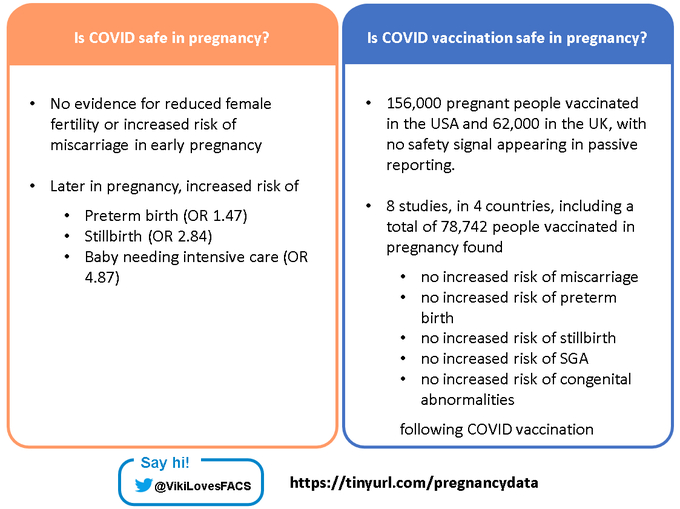
Are you #breastfeeding? Thinking about whether to get the #COVID19 #vaccine?
🤱🏾💉🤔
This is a thread for you!
🧵...
🤱🏾💉🤔
This is a thread for you!
🧵...
People who are breastfeeding can sometimes get forgotten in the focus on pregnancy. But your questions matter too! And I particularly want to make space to address those questions because a lot of people have contacted me, worried about one particular blog post... 2/
I'll get to that later. But let's start by saying that @RCObsGyn and @MidwivesRCM recommend the COVID vaccine if you are breastfeeding. 3/
rcog.org.uk/en/guidelines-…
rcog.org.uk/en/guidelines-…
There are a number of reasons for this.
First, the vaccine protects you. It can be easy to put yourself in second place when you have a new baby, but you are important and your health matters! 4/
First, the vaccine protects you. It can be easy to put yourself in second place when you have a new baby, but you are important and your health matters! 4/
Protecting yourself is also good for your baby.
You are much better able to look after your baby if you are well.
We also know from other infectious diseases that the person most likely to give an infection to baby is a family member. Vaccination reduces this risk. 5/
You are much better able to look after your baby if you are well.
We also know from other infectious diseases that the person most likely to give an infection to baby is a family member. Vaccination reduces this risk. 5/
We also know that, after vaccination, breast milk contains antibodies that are expected to give your baby some protection against COVID.
Too many studies show this now for me to go through them one by one. But you can find them here under q10... 6/
drive.google.com/file/d/1_wHIYX…
Too many studies show this now for me to go through them one by one. But you can find them here under q10... 6/
drive.google.com/file/d/1_wHIYX…
So much for the benefits of vaccination, for you and your baby. But is it safe?
Our national vaccine safety surveillance scheme, Yellow Card, finds no evidence that vaccination while breastfeeding causes any harm to breastfed babies and children. 7/
gov.uk/government/pub…
Our national vaccine safety surveillance scheme, Yellow Card, finds no evidence that vaccination while breastfeeding causes any harm to breastfed babies and children. 7/
gov.uk/government/pub…
That blog post I mentioned makes two safety claims. And judging by my inbox, they're worrying people. So let's tackle them here... 8/
The first is that vaccine mRNA makes it into breast milk, and that this could be concerning.
Two studies have not been able to find vaccine mRNA in breast milk. One, that concentrated the milk first, was about to find about 2 parts per billion in 3 out of 10 milk donors. 9/
Two studies have not been able to find vaccine mRNA in breast milk. One, that concentrated the milk first, was about to find about 2 parts per billion in 3 out of 10 milk donors. 9/
To put 2 parts per billion into context, that is equivalent to squirting a half syringe of Calpol (2.5 ml) into an Olympic swimming pool and giving it a good mix. You're not going to get a lot of Calpol back. 10/
The authors of the study called this "minimal" transfer of vaccine and concluded,
"Lactating individuals should continue breastfeeding in an uninterrupted manner after receiving SARS-CoV-2 mRNA vaccination." 11/
medrxiv.org/content/10.110…
"Lactating individuals should continue breastfeeding in an uninterrupted manner after receiving SARS-CoV-2 mRNA vaccination." 11/
medrxiv.org/content/10.110…
Even a larger transfer would not be particularly concerning, since the vaccine will be broken down in the gut (if it wasn't, we would administer vaccines orally, which is much nicer than by injection!)
More about this here... 12/
More about this here... 12/
https://twitter.com/VikiLovesFACS/status/1410147655737544707?s=20
The second claim from this blog post, is that there is a report in VAERS of a baby who got thrombocytopaenia after their mother was vaccinated. 13/
But remember that VAERS collects reports of events that have happened after vaccination, but until these events are investigated we can't say if they're caused by vaccination. 14/
In any case, people who have tried to confirm the veracity of this report have been unable to. So it might even be the case that this never actually happened. 15/
eu.usatoday.com/story/news/fac…
eu.usatoday.com/story/news/fac…
So #COVID19 #vaccination in those who are #breastfeeding...
👉🏻 Recommended by professional bodies
👉🏻 Protects you and your baby
👉🏻 Safe
16/16
👉🏻 Recommended by professional bodies
👉🏻 Protects you and your baby
👉🏻 Safe
16/16
PS. I've been in two minds as to whether to link to the blog post, since the last thing I want to do is spread misinformation. But I think it may enhance the ability of those who are worried about this to find this thread, the blog post is here...
hartgroup.org/risk-to-babies…
hartgroup.org/risk-to-babies…
... and a more detailed response to it than I've set out above is here...
https://twitter.com/drdpogson/status/1408356782695661568?s=20
• • •
Missing some Tweet in this thread? You can try to
force a refresh




